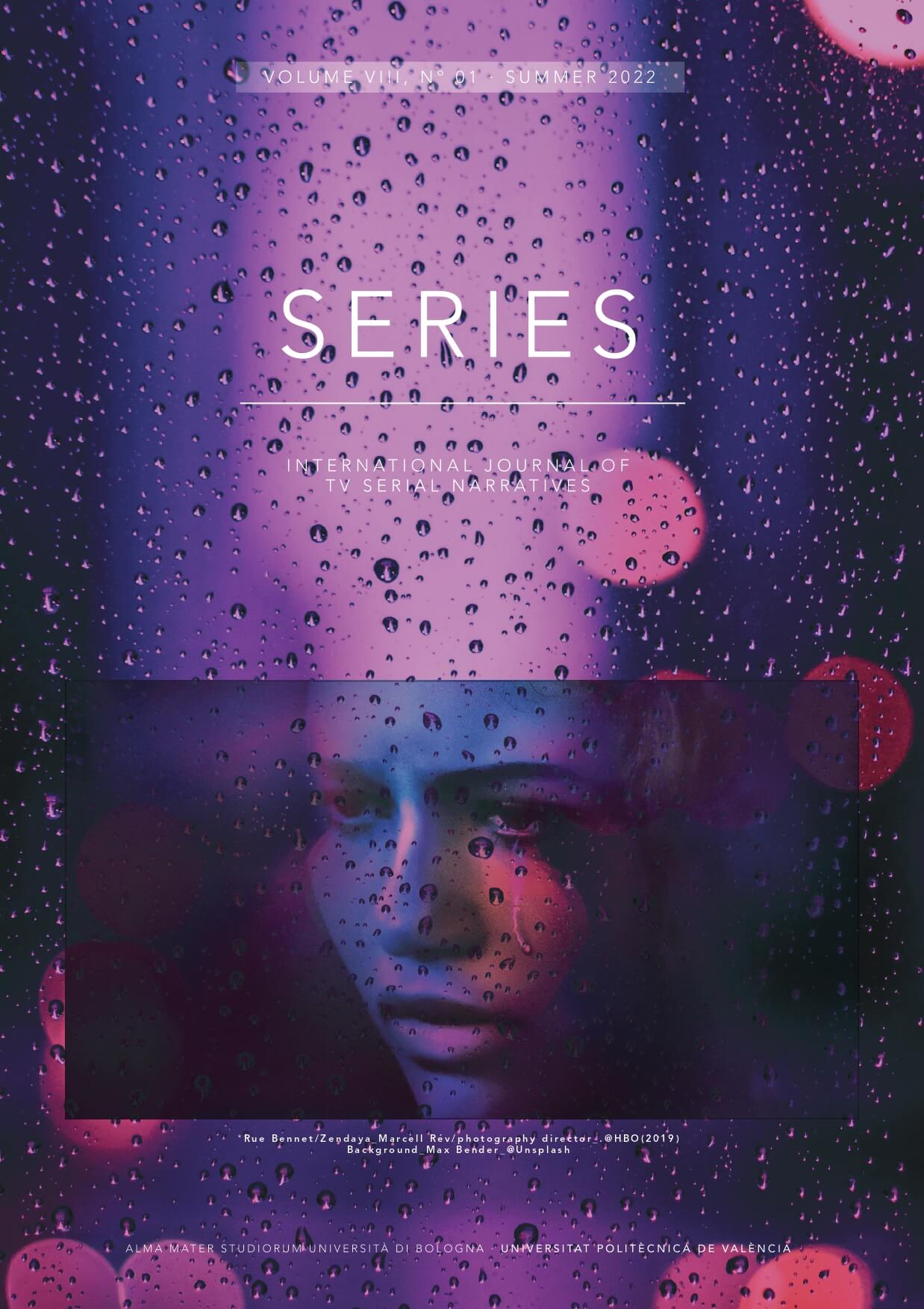“I’m Not Always the Most Reliable Narrator”. On Character Voice-Over as a Rhetorical Resource in HBO’s “Euphoria”
DOI:
https://doi.org/10.6092/issn.2421-454X/13657Parole chiave:
Voice-over, narrator, rhetorical resources, seriality, EuphoriaAbstract
Voice-over narration features in various ways in contemporary TV series. One recent series that employs voice-over extensively is HBO’s Euphoria. In the series, the protagonist, Rue, narrates repeatedly in each episode of the first season and critics have labelled her voice-over with terms such as “unreliable” or “omniscient”. The aim of this article is to analyze the uses of character voice-over in Euphoria and to argue that such analysis require examining the theoretical terminology often applied to film and TV voice-overs. The article argues that character voice-over should not be defined based on a structuralist narratological conception of the narrator. Rather, voice-over should be approached within a framework of narrative rhetoric and viewed as a medium-specific rhetorical resource. The proposed view, as opposed to one classifying different types of voice-over narrators, is better able to explain how voice-over works in serial storytelling and how this resource is employed in Euphoria to create different effects and affect the audience in different ways.
Riferimenti bibliografici
Allrath, Gaby, Marion Gymnich and Carola Surkamp (2005). “Introduction: Towards a Narratology of TV Series.” In Narrative Strategies in Television Series, edited by Gaby Allrath and Marion Gymnich, 1-43. London: Palgrave Macmillan.
Bordwell, David (1985). Narration in the Fiction Film. Madison: University of Wisconsin Press.
Branigan, Edward (1984). Point of View in the Cinema: A Theory of Narration and Subjectivity in Classical Film. Berlin: Mouton.
Chatman, Seymour (1999). “New Directions in Voice-Narrated Cinema.” In Narratologies: New Perspectives on Narrative Analysis, edited by David Herman, 315-339. Columbus: The Ohio State University Press.
Chion, Michel (1999). The Voice in Cinema. New York: Columbia University Press.
Garwood, Ian (2013). The Sense of Film Narration. Edinburgh: Edinburgh University Press.
Genette, Gérard (1980). Narrative Discourse: An Essay in Method. Ithaca, New York: Cornell University Press.
Kozloff, Sarah (1988). Invisible Storytellers: Voice-Over Narration in American Fiction Film. Columbia: Columbia University Press.
Kozloff, Sarah (1992). “Narrative Theory and Television.” In Channels of Discourse, Reassembled: Television and Contemporary Criticism, edited by Robert C. Allen, 67-100. Chapel Hill: The University of North Carolina Press.
Lawrence, Britt (2019). “There's A Pretty Wild HBO Euphoria Fan Theory Running Around.” Cinemablend. https://www.cinemablend.com/television/2476109/theres-a-pretty-wild-hbo-euphoria-fan-theory-running-around (last accessed 02-09-2021).
Labov, William (1972). Language in the Inner City: Studies in the Black English Vernacular. Philadelphia: University of Pennsylvania Press.
McDonald, Jordan (2019). “HBO’s ‘Euphoria’ presents a diagnosis of Generation Z.” The Dartmouth. https://www.thedartmouth.com/article/2019/08/hbos-euphoria-presents-a-diagnosis-of-generation-z (last accessed 02-09-2021).
Metz, Christian (1974). Film Language. New York: Oxford University Press.
Metz, Christian (2016). Impersonal Enunciation, or the Place of Film. New York: Columbia University Press.
Mittell, Jason (2015). Complex TV: The Poetics of Contemporary Television Storytelling. New York and London: New York University Press.
Nugent, Annabel (2021). “Euphoria Second Special Review: Hunter Schafer Shines as Provocative Teen Drama Unfurls Beyond Zendaya’s Rue.” The Independent. https://www.independent.co.uk/arts-entertainment/tv/reviews/euphoria-special-review-hunter-schafer-b1792340.html (last accessed 02-09-2021).
O’Sullivan, Sean (2019). “Six Elements of Serial Narrative.” Narrative 27(1): 49-64. doi:10.1353/nar.2019.0003.
Perez, Gilberto (2019). The Eloquent Screen: A Rhetoric of Film. Minnesota: University of Minnesota Press.
Phelan, James (2017). Somebody Telling Somebody Else: A Rhetorical Poetics of Narrative. Columbus: The Ohio State University Press.
Sepinwall, Alan (2019). “‘Euphoria’ Review: Fast Times at Warp Speed.” Rolling Stone. https://www.rollingstone.com/tv/tv-reviews/euphoria-review-zendaya-845443/ (last accessed 02-09-2021).
Sharf, Zack (2019). “‘Euphoria’ Actor Jacob Elordi Shuts Down Fan Theories About Rue’s Death.” Indiewire. https://www.indiewire.com/2019/08/euphoria-rue-dead-narrator-fan-theory-jacob-elordi-1202163701/ (last accessed 02-09-2021).
Downloads
Pubblicato
Come citare
Fascicolo
Sezione
Licenza
Copyright (c) 2022 Roger Edholm

Questo articolo è soggetto a licenza Creative Commons Attribution 3.0 Unported License.




